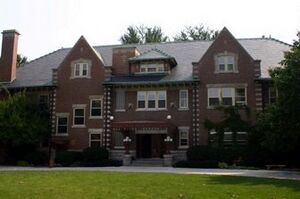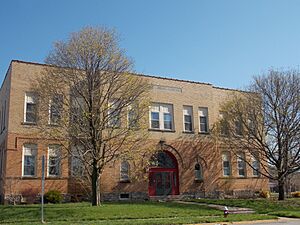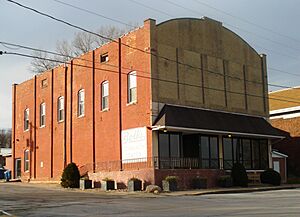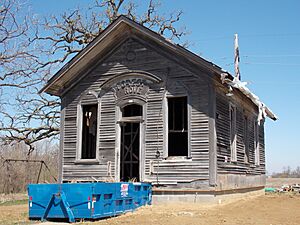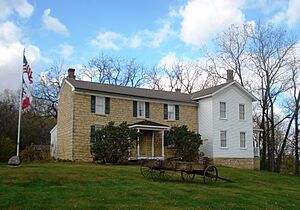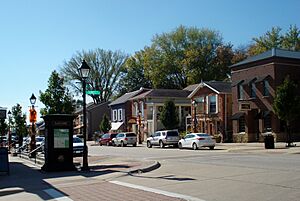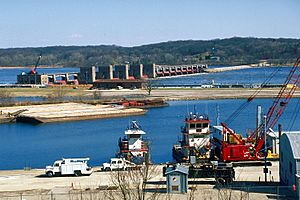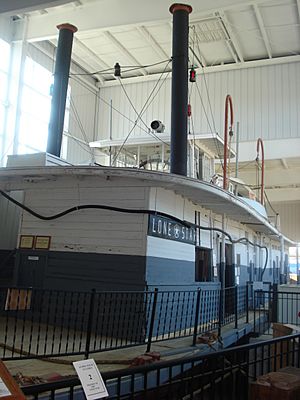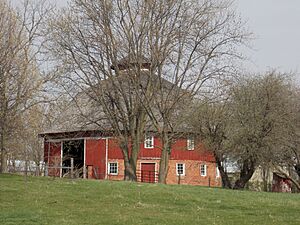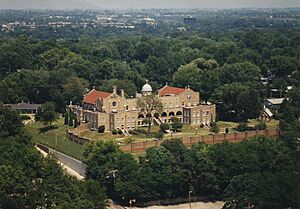National Register of Historic Places listings in Scott County, Iowa facts for kids
Have you ever wondered about old buildings and places that are super important to history? In Scott County, Iowa, there's a special list of places called the National Register of Historic Places. It's like a hall of fame for buildings, districts, and other spots that tell amazing stories about the past in the United States.
There are 288 places from Scott County on this list! Most of them, about 257, are in the city of Davenport. Those are on their own separate list. But this article will tell you about the other 32 cool places outside of Davenport, including one very special spot called a National Historic Landmark. These places help us remember and learn about the history of Scott County.
Contents
- Historic Places Outside Davenport
- Homes with History
- Joseph F. Bettendorf House
- James Brown House
- Alexander Brownlie House
- Dawley House
- East Hill House and Carriage House
- James Gamble House
- Horton–Suiter House
- McCaffrey House
- Old Mill House
- Rambo House
- John Smith House
- Roswell Spencer House
- Stone House
- Jacob Suiter House
- John H. Suiter House
- William Suiter House
- George Tromley Jr. House
- George Tromley, Sr., House
- Samuel Van Sant House
- Schools and Community Buildings
- Special Historic Sites
- Homes with History
Historic Places Outside Davenport
Scott County is full of interesting historic places beyond Davenport. Let's explore some of them!
Homes with History
Many old houses in Scott County have amazing stories.
Joseph F. Bettendorf House
The Joseph F. Bettendorf House is a huge, 28-room mansion in Bettendorf. It was built by Joseph W. Bettendorf, who was an important businessman. He and his brother are actually who the city of Bettendorf is named after! Today, this big house is used as a private school. Imagine going to school in such a historic building!
James Brown House
In Riverdale, you can find the James Brown House. This house was built way back in 1842. It's a great example of the Greek Revival style, which was popular a long time ago.
Alexander Brownlie House
The Alexander Brownlie House in Long Grove is an old farm house built in 1846. It shows us what homes were like for farming families almost 200 years ago.
Dawley House
The Dawley House in Le Claire was built in 1851. It's a type of house called vernacular Italianate. This means it has some features of the Italianate style but also includes local building traditions. It's part of a group of houses called the "Houses of Mississippi River Men," which tells us about people who worked on the Mississippi River.
East Hill House and Carriage House
In Riverdale, the East Hill House and Carriage House is a beautiful home built in 1926. It's designed in the Colonial Revival style, which means it looks back to older American colonial designs.
James Gamble House
Another interesting home in Le Claire is the James Gamble House, built in 1855. This house is also in the Italianate style, known for its decorative features and often tall, narrow windows.
Horton–Suiter House
The Horton–Suiter House in Le Claire dates back to 1860. Like the Dawley House, it's also part of the "Houses of Mississippi River Men" group, showing the history of river workers.
McCaffrey House
The McCaffrey House, built in 1870, is another vernacular Italianate style house in Le Claire. It's also part of the "Houses of Mississippi River Men" collection.
Old Mill House
The Old Mill House in Le Claire was built in 1851. It's a Greek Revival style home and another one of the "Houses of Mississippi River Men."
Rambo House
The Rambo House in Le Claire was built in 1855 and is an Italianate style house. It's also part of the "Houses of Mississippi River Men" group.
John Smith House
The John Smith House in Le Claire was built in 1852. It's another example of the homes connected to the "Houses of Mississippi River Men" history.
Roswell Spencer House
The Roswell Spencer House in Pleasant Valley Township was built in 1850. It's a historic home located off U.S. Route 67.
Stone House
The Stone House in Le Claire is a unique building made of stone. It's located at 817 N. 2nd Street.
Jacob Suiter House
The Jacob Suiter House in Le Claire was built in 1860. It's a vernacular Italianate style house and part of the "Houses of Mississippi River Men."
John H. Suiter House
The John H. Suiter House in Le Claire was built in 1855 and is another home from the "Houses of Mississippi River Men" collection.
William Suiter House
The William Suiter House in Le Claire was also built in 1855 and is part of the "Houses of Mississippi River Men."
George Tromley Jr. House
The George Tromley Jr. House in Le Claire was built in 1865. It's another house connected to the "Houses of Mississippi River Men."
George Tromley, Sr., House
The George Tromley, Sr., House in Le Claire was built in 1850. It's also part of the "Houses of Mississippi River Men" group.
Samuel Van Sant House
The Samuel Van Sant House in Le Claire was built in 1860. This house is also part of the "Houses of Mississippi River Men" collection.
Schools and Community Buildings
Some historic places were once important gathering spots for learning and community.
Bettendorf–Washington School
The Bettendorf–Washington School in Bettendorf was once an elementary school. Later, it even housed a museum!
Buffalo High School
The Buffalo High School in Buffalo used to be a school and a community center. Now, it's a private home. It's cool to see how old buildings can find new uses!
Community Building (Princeton, Iowa)
The Community Building in Princeton was once a commercial building. Today, it's home to the Boll's Community Center, a place for people to gather.
Eldridge Turn-Halle
The Eldridge Turn-Halle in Eldridge was a Turnverein, which was a German-American club for gymnastics and social activities. Sadly, this building was destroyed in a fire in 2013.
Forest Grove School No. 5
Near Bettendorf, you can find Forest Grove School No. 5. This was a one-room schoolhouse built in 1873. Imagine all the kids who learned their ABCs and math in that very room!
Stone School (Le Claire, Iowa)
The Stone School was a one-room schoolhouse built of stone near Le Claire. It was located along the old Territorial Road. Unfortunately, this building has since been taken apart.
Special Historic Sites
Some places are famous for the people who lived there or for their unique features.
Buffalo Bill Cody Homestead
South of McCausland is the Buffalo Bill Cody Homestead. This was the childhood home of Buffalo Bill Cody! He was a famous government scout and a performer in amazing "Wild West" shows. It's a great place to learn about his early life.
Cody Road Historic District
In Le Claire, Cody Road is the main street. The Cody Road Historic District includes many important buildings along this road, especially in the downtown area. It's a great place to walk around and see historic architecture.
Lock and Dam No. 14 Historic District
The Lock and Dam No. 14 Historic District is located in Pleasant Valley Township. This district includes a building, several structures, and objects related to the lock and dam system on the Mississippi River. Locks and dams help boats travel safely on the river by raising or lowering the water level.
Lone Star (towboat)
The LONESTAR is a very special historic boat located at the Buffalo Bill Museum in Le Claire. It's an 1868 wooden, paddlewheel, steam-powered towboat. This boat is so important that it's been named a National Historic Landmark! It's a fantastic example of the boats that used to work on the Mississippi River.
Nebergall "Knoll Crest" Round Barn
The Nebergall "Knoll Crest" Round Barn is a unique building located on Telegraph Road near Blue Grass. It's a round barn, which is pretty unusual! It was built in 1914 by Benton Steele. Round barns were sometimes built to be more efficient for farmers.
Regina Coeli Monastery
The Regina Coeli Monastery in Bettendorf was originally built for a group of nuns called the Discalced Carmelite nuns. It's a beautiful building in the Romanesque Revival style. Over time, it became a hotel, and now it helps people at an addictions rehabilitation facility.


